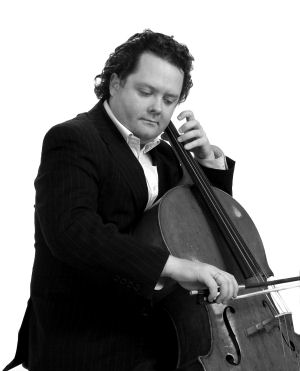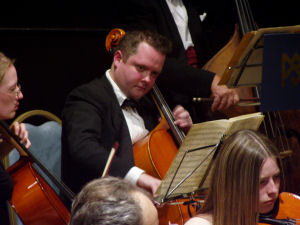|
DAVID
O'CONNELL

Irish
cellist David O 'Connell won a place to study with Moray Welsh and Hannah
Roberts at the Royal Northern College of music in Manchester, were he
subsequently won the Sir John Barbirolli prize for cello at the end of
his fourth year, and further studies continued later with Ludwig Quandt
in Berlin. After his undergraduate studies, he immediately entered the
profession working with the BBC Philharmonic, the City of Birmingham Symphony
Orchestra, the Royal Philharmonic Orchestra London and later in Germany
with the Berliner Symphoniker and the Stadtlichesorchester Bremerhaven,
under conductors Simon Rattle, Gennady Roshdesvensky, Danielle Gatti and
Uri Temarkirov. Festival appearances with these orchestras include the
BBC Proms, Edinburgh, Luzern and Berliner Festwochen. His solo recitals
have been broadcast by both BBC and RTE radio, and he has recorded a disc
of Brahms and Debussy cello sonatas with Berlin - based pianist Corrina
Soller.
On returning to Scotland, David O Connell became closely associated with
its leading contemporary music group, the Glasgow based Paragon ensemble
and played this January in their 25th anniversary concerts under leading
Scots conductor Gary Walker. His eclectic interests in music brought him
into contact with The Chieftains and 70's Californian super-group BREAD,
with whom he has played concerts. Whilst living in Berlin David worked
on many soundtracks for German TV, Radio and movies.
David O'Connell now devotes a lot of time to teaching and was delighted
to become a member of the instrumental team for Perth and Kinross Council
under director Allan Young. He is also senior visiting tutor of cello
at Aberdeen's specialist music school Dyce Academy. In August 2003, at
the age of thirty, David became the youngest member of the String faculty
at the RSAMD in Glasgow were he is now a professor of cello and lecturer
in chamber music.
David writes
of the Elgar Cello Concerto:
There can't be many musical documents as synonymous with the passing of
an era as Elgar's last masterpiece. World War 1 had ripped Europe apart
and a personality as highly sensitive as Elgar's was only just able to
manage with the appalling spectre of suffering on a scale such as this.
This greatest of English men was deeply passive. In this great and sad
work, the listener is confronted by one man's mourning for what he perceived
to be the passing of a lost world. If the centrepiece to Enigma Variations,
Nimrod, is a hymn to man's best qualities, then the cello concerto, in
parts certainly, is a pained anthem of complaint about man's seemingly
endless ability to bring bloodshed on his fellow kind.
From those now famous and awesome opening chords, the listener is left
in no doubt as to the strength of this old and gentle man's feelings.
This anger however quickly gives way to the haunted and introspective
feeling that pervades a lot of the work.
The contemporary cellist is faced with a two-fold challenge when he or
she takes this concerto to the concert platform. Not only are they confronted
with the task of representing the huge dynamic of Elgar's profound sadness,
but also of dealing with the considerable extra poignancy afforded to
it by its greatest interpreter, the late Jacqueline Du Pre, who lost her
ability to play at the very peak of her unearthly powers to multiple sclerosis.
When Elgar refrains the slow movement near the very end of the concerto,
not many moments in 20th century music spring to mind as being as lonely,
lost and purely sad; the anger suddenly springs to the surface with the
reprise of the opening chords and the music dashes to its inevitable end.

David
O'Connell playing with PSO in November 2004
|
![]()
![]()
![]()